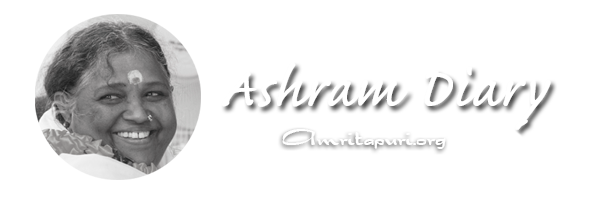Swami continued the discussions on the ninth chapter of the Gita, with an often mistunderstood verse; ‘mam hi partha vyapasritya, yepi syur papayonayah, striyas vaishyas tatha shudras, tepi yanti param gatim.’
This is a part where many people become confused. The Lord says, even if one is born of a sinful womb, such as women, vaishyas, and shudras, through taking refuge in Me, they attain the Supreme State.’
Here, we have to ask, ‘why does it say that women are born of sinful wombs, or ‘papa yonayah’? Is that right? To reply to that, Swami explained that the Gita is always according to the spiritual principles. The principle being shown here is that of karma. When it says the word ‘papa,’ we should remember that the fruit of papa is ‘duhkham,’ suffering. Therefore, the Lord is merely pointing out the groups of people that have to undergo more suffering in life.
For example, a woman has to bear a child in her for nine months. That is a lot of suffering to go through. Men don’t have to do that. So, it is natural that any suffering is experienced due to the papa commited by one in this birth or any previous one. That is why the Lord says that this group is ‘papa yonis.’ This is just a general principle. Swami said that if any brahmacarins are living happily in the ashram, then they can consider that this doesn’t apply to them. This is merely said to the general groups of society, in relation to the amount of suffering in one’s life.
As for the other two groups, the vaishya and shudra, these two had to undergo more physical strain and work. The other classes, the kshatriya and brahmana, had relatively less of this. The Kshatriyas, mainly kings, could sit happily in their palace, and if there is a war, they may die, but that is just a moment and then over. Then the brahmanas, they were the priests, and that was their main work, so they had much less physical strain. They also recieved the dakshinas from the kings, so they lived happily. The other two, vaishya and shudra, had more physical strain, so it is natural that such suffering is a result of papa. This isn’t meant to put down any group of society, and is by all means not in every case. We should understand that the Lord is saying this on the basis of the law of karma, that is all.
However, others have commented differently here, in an attempt to ‘save’ the Gita. They say, ‘stri’ doesn’t mean physical women, it means those without mental courage, whether a man or woman. Swami said that it isn’t necessary to imagine such interpretations. The word ‘stri’ is defined as ‘woman’ in Sanskrit, and this meaning is also accepted by all the great acaryas. Still, some people feel bad when they don’t properly understand the meaning, so they create their own. Either way, the Lord says that anyone in suffering, who was born in this present birth to suffering due to previous papa, can attain that supreme state of Moksha through taking refuge in the Lord.
Piyush
June 4, 2007


Leave a Reply
You must be logged in to post a comment.